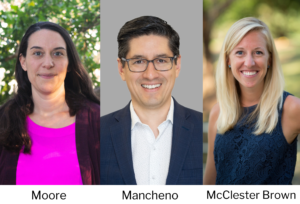
A UNC Family Medicine collaboration with Piedmont Health Services (PHS) and partners has resulted in a $3 million Health Resources and Services Administration (HRSA) grant to improve training in overcoming language and disability barriers, which limit access to care for many patients. The 5-year project, “Primary Care Training and Enhancement – Language and Disability Access to University of North Carolina at Chapel Hill,” is focused on building and developing curriculum and program experiences to enhance the training for medical students and residents in our primary care program in providing culturally and linguistically appropriate care for individuals with limited English proficiency and individuals with physical or intellectual and developmental disabilities.
Lead investigator for the project Modjulie Moore, MD, states, “Throughout our rural communities in North Carolina we hear consistently from our patients the need for providers who can care for them in their preferred language and with cultural grace. We are grateful for this opportunity to dedicate time and resources to listening to our patients and working together with our community-based care centers and partners to develop training experiences for our future providers to meet patients where they need us the most.” Moore is a UNC Family Medicine Assistant Professor and Director of the North Carolina Farmworker Health Program.
UNC Family Medicine and PHS, a Federally Qualified Health Center (FQHC), have a well-established partnership with many UNC faculty caring for patients and teaching residents and learners. The residency’s “FQHC Track” consists of two locations – Siler City Community Health Center and Prospect Hill Community Health Center. The track is part of a collaboration among UNC Family Medicine, PHS, and UNC Health to train family physicians to practice in rural and underserved communities and support the local rural healthcare workforce. The communities at both Health Centers have high percentages of non-English speakers.
 Adrian Mancheno, MD, Chief Medical Officer of PHS, addresses this issue and the importance of the project. “In 2022, 48% of patients at Piedmont Health Services reported they were best served in a language other than English – a trend we’ve seen steadily increasing over the past decade. We believe that an increased focus on serving populations with limited English proficiency and disabilities during training will help prepare the next generation of healthcare workers to provide high-quality and culturally sensitive care in the communities we serve.”
Adrian Mancheno, MD, Chief Medical Officer of PHS, addresses this issue and the importance of the project. “In 2022, 48% of patients at Piedmont Health Services reported they were best served in a language other than English – a trend we’ve seen steadily increasing over the past decade. We believe that an increased focus on serving populations with limited English proficiency and disabilities during training will help prepare the next generation of healthcare workers to provide high-quality and culturally sensitive care in the communities we serve.”
Mallory McClester Brown, MD, Director of the UNC Family Medicine Residency Program, addresses disability and how it relates to older adults, “According to the CDC Disability Impacts All of Us information campaign, 26% of adults in the U.S. (61 million) and 29% of adults in North Carolina (2.4 million) have at least one disability impacting mobility, cognition, independent living, hearing, vision, or self-care. While disability can impact anyone throughout their lifespan, older adults are disproportionately burdened. This grant opportunity will allow us to bolster the education we provide to our resident trainees around the care of the older adult, particularly in settings such as the PHS Program of All Inclusive Care of the Elderly (PACE) sites, local short-term nursing facilities, and in local continuing care retirement communities.”
Due to significant changes in the Accreditation Council for Graduate Medical Education (ACGME) resident curriculum, primary care residencies are now tasked to enhance community-based learning for students and residents. This lines up with a national effort to address health disparities in rural and underserved areas, with many studies indicating that doctors who trained in rural and underserved areas are more likely to end up working in rural and underserved communities1. Because of this, the partnership between UNC Family Medicine and Piedmont Health Services has been replicated nationally, with UNC being the hub for Rural GME, which helps in the development of new rural residency programs around the country.
UNC was one of 18 locations that HRSA selected “to train primary care medical students, physician assistant students, and medical residents in providing culturally and linguistically appropriate care for individuals with limited English proficiency and individuals with physical or intellectual and developmental disabilities.” Read more, here.
The project is led by Moore and McClester Brown, and includes project manager Kelsey Ross Dew, MPH, CHES, Marni Gwyther Holder, MSN, RN, Jen Martini, MD, Sapna Varkey, PhD, and Ana Laura Bermúdez, MD, from UNC School of Medicine’s Comprehensive Advanced Medical Program of Spanish (CAMPOS), as well as PHS’s Mancheno, Joan East, MD, and Plutarco Acosta.
